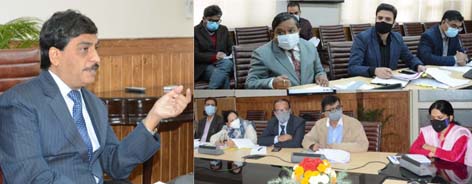Excelsior Correspondent
SRINAGAR, Oct 11: The Chief Secretary today reviewed the centrally sponsored schemes of Housing & Urban Development namely, AMRUT, Swacch Bharat Mission and PM Svanidhi, which are nearing saturation. This follows an advisory from the Central Government regarding speeding up the implementation of the CSSs, which are nearing saturation within the pre set timelines, so that the benefits of these schemes are passed on to the people of the UT.
Principal Secretary, Housing and Urban Development Department, Commissioners of Jammu and Srinagar Municipal Corporations, Directors of Urban Local Bodies Jammu and Kashmir and other senior officers of the department participated in the meeting.
It was informed in the meeting that AMRUT scheme was launched in the year 2015 for providing basic services like water supply, sewerage, urban transport to households and build amenities to improve the quality of life.
It was further informed that initially 91 projects for 5 cities of erstwhile of State of J&K, namely, Jammu, Srinagar, Anantnag, Leh and Kargil were approved for an allocation of Rs 593 cr. After reorganisation of the erstwhile state of J&K, 83 projects have been approved for J&K and out of these projects, the total allocation for UT of J&K is Rs 513.13 cr for 74 projects while 9 projects have been taken up under savings in state share and reforms incentives.
Out of 83 projects approved for J&K, 62 projects have been completed while 21 projects are under different stages of execution.
Principal Secretary, H&UD informed that 62 projects have been completed at an aggregate expenditure of Rs. 394.55 cr.
While reviewing the projects both completed as well as under implementation in Anantnag, the Chief Secretary inquired about the impact of these projects on the people of the Anantnag town. He advised the engineers to look for the deliverables/ positive benefits from these projects instead of solely being guided by the need to finish these projects.
He directed them to also examine the effluent value of the STP while also studying whether the extent of water logging has been reduced by the construction of storm drainage systems in such areas.
Dr Mehta emphasised on the need of devising service level benchmarks for all such projects, besides institutionalising a system of seeking feedback from the people of the area.
The Chief Secretary observed that cities/towns have to prioritise solid waste management over addressing the issue arising from chronic water logging and provision of amenities like parks/ gardens.
Dr Mehta directed that all the ongoing 21 projects should be completed by March 2022. In reference to the ongoing project, namely multi tier parking at Panjtirthi, he directed that since three levels have already been constructed, the remaining fourth level should be completed by Jan 2022 and if the executing authority holds a contrarian view, he shall have to explain the reasons within the next week.
Dr Mehta directed both the Commissioners of the Municipal Corporations to put in place an SoP for septic management and ensure that there is annual cleaning of drains especially during pre and post monsoon season.
Dr Mehta advised Commissioners of the two municipal corporations to ensure regular street sweeping in the municipal limits. He advised Commissioner JMC to ensure that if highways pass through the municipal areas, NHIA ought to attend to sweeping of the highways in accordance with the norms set by the Municipal Corporation.
The Chief Secretary directed that the process of collection of door to door refuse/ garbage collection at least twice a week should begin in all 78 local bodies from 18th of this month.
While informing about the ongoing clean India campaign/ Swacchta pakhwada, he advised the officers to launch regular IEC campaigns to sensitise people of the imperative of keeping the cities and towns clean.
While reviewing PM Svanidhi, he appreciated the efforts of the DULB, Jammu and directed all the officers to clear the uploaded applications on the portal within the next 10days and furnish the certificate of saturation.


